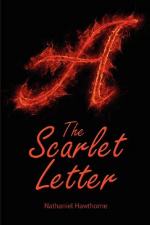Before Roger Chillingworth could answer, they heard the clear, wild laughter of a young child’s voice, proceeding from the adjacent burial-ground. Looking instinctively from the open window—for it was summer-time—the minister beheld Hester Prynne and little Pearl passing along the footpath that traversed the enclosure. Pearl looked as beautiful as the day, but was in one of those moods of perverse merriment which, whenever they occurred, seemed to remove her entirely out of the sphere of sympathy or human contact. She now skipped irreverently from one grave to another; until coming to the broad, flat, armorial tombstone of a departed worthy—perhaps of Isaac Johnson himself—she began to dance upon it. In reply to her mother’s command and entreaty that she would behave more decorously, little Pearl paused to gather the prickly burrs from a tall burdock which grew beside the tomb. Taking a handful of these, she arranged them along the lines of the scarlet letter that decorated the maternal bosom, to which the burrs, as their nature was, tenaciously adhered. Hester did not pluck them off.
Roger Chillingworth had by this time approached the window and smiled grimly down.
“There is no law, nor reverence for authority, no regard for human ordinances or opinions, right or wrong, mixed up with that child’s composition,” remarked he, as much to himself as to his companion. “I saw her, the other day, bespatter the Governor himself with water at the cattle-trough in Spring Lane. What, in heaven’s name, is she? Is the imp altogether evil? Hath she affections? Hath she any discoverable principle of being?”
“None, save the freedom of a broken law,” answered Mr. Dimmesdale, in a quiet way, as if he had been discussing the point within himself, “Whether capable of good, I know not.”
The child probably overheard their voices, for, looking up to the window with a bright, but naughty smile of mirth and intelligence, she threw one of the prickly burrs at the Rev. Mr. Dimmesdale. The sensitive clergyman shrank, with nervous dread, from the light missile. Detecting his emotion, Pearl clapped her little hands in the most extravagant ecstacy. Hester Prynne, likewise, had involuntarily looked up, and all these four persons, old and young, regarded one another in silence, till the child laughed aloud, and shouted—“Come away, mother! Come away, or yonder old black man will catch you! He hath got hold of the minister already. Come away, mother or he will catch you! But he cannot catch little Pearl!”
So she drew her mother away, skipping, dancing, and frisking fantastically among the hillocks of the dead people, like a creature that had nothing in common with a bygone and buried generation, nor owned herself akin to it. It was as if she had been made afresh out of new elements, and must perforce be permitted to live her own life, and be a law unto herself without her eccentricities being reckoned to her for a crime.




